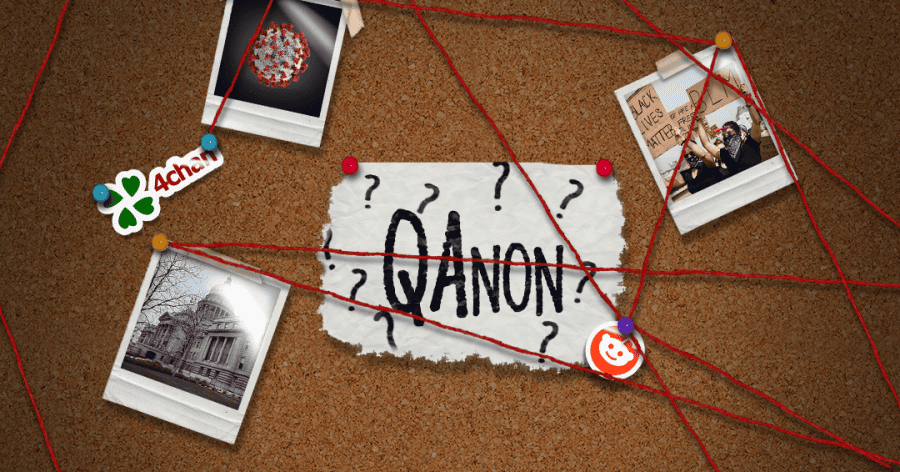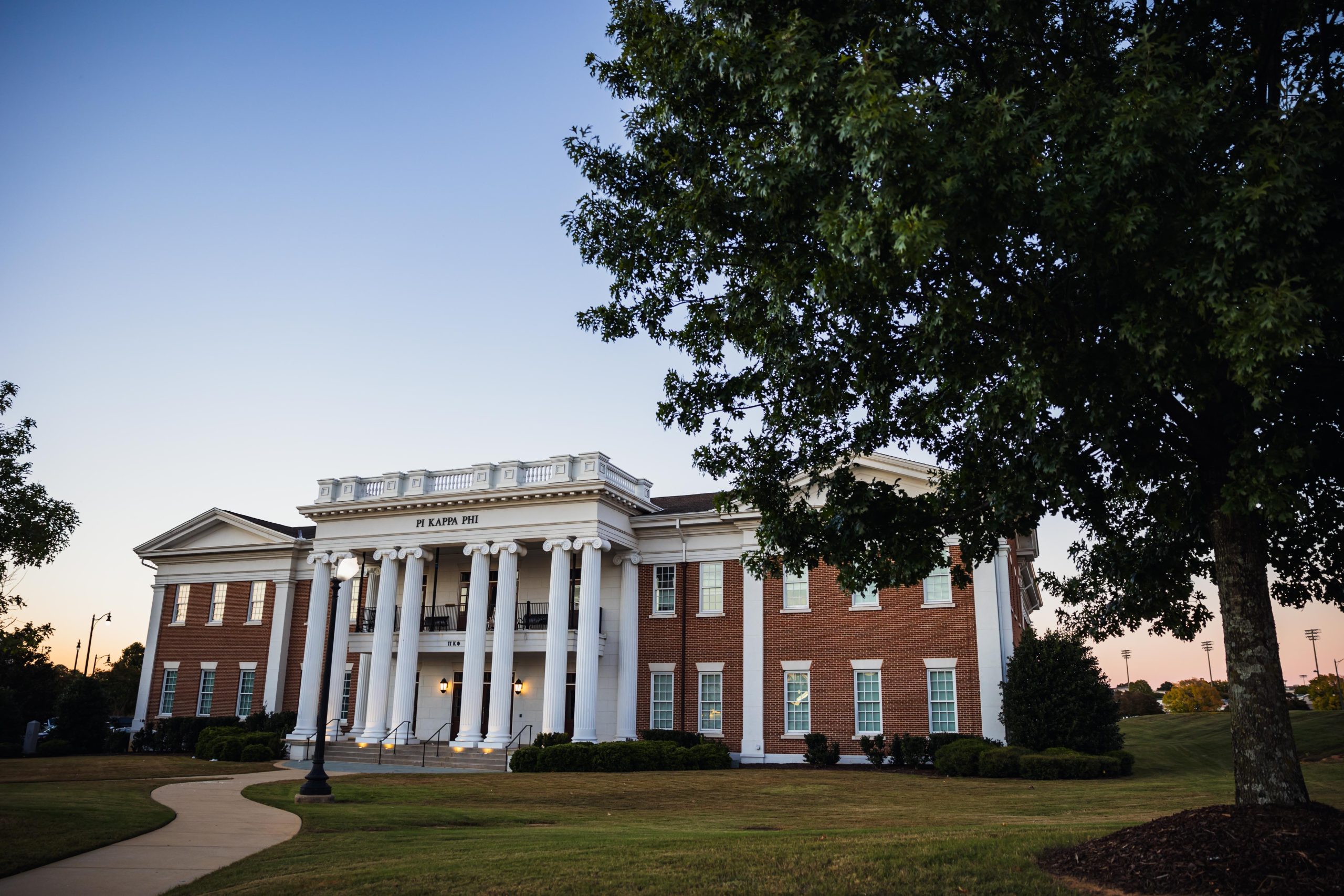Opinion | 2020: Just one big conspiracy?
September 30, 2020
#QAnon, #Pizzagate, #WWG1WGA, #DeepState: If you have come across these trending phrases on Twitter and Facebook, you are not alone in asking “What does this mean?” These conspiracies are often propagated by right-wingers who have been held captive by online message boards such as Reddit and 4chan, which are watering holes for conspiracy theorists.
QAnon followers are exceptionally obsequious to their ideology. Their principles largely center on the belief that Washington’s top politicians, mostly Democrats, are a part of a Satan-worshipping, human-trafficking cult and President Donald Trump is the only person standing between them and the ultimate destruction of the country. No, really, that is their core belief.
Additionally, they believe an anonymous individual, affectionately named ‘Q’— who has top clearance to classified information within the government — sends subliminal messages to his disciples to help expose corrupt politicians and national leaders. This cabal of Satan-worshipping pedophiles, according to QAnon followers, also controls the media and large banks, and they are locked in battle with Trump who is earnestly trying to usher in “The Great Awakening.” They are unified in their trademark hashtag, #WWG1WGA, which stands for “Where we go one, we go all.”
To provide context (and to understand the depth of lunacy), an antecedent to QAnon – and most likely a catalyst for the movement – was Pizzagate. Pizzagate arose after Comet Ping Pong, a pizza parlor in Washington D.C., was accused of being headquarters for politicians to traffick children using their basement space.
This “discovery” was thanks to Wikileaks, which leaked former Clinton Campaign Chairman John Podesta’s emails in 2016. Podesta’s emails contained invitations and requests for fundraisers at Comet, but online conspiracy theorists claimed words such as “pizza” and “cheese” used in the correspondence were codewords used to smuggle children.
Ultimately, this led to Edgard Madison Welch brandishing an AR-15 in the crowded restaurant attempting to rescue the non-existent children. After a thorough investigation by both local police and the Department of Justice, there was no evidence to substantiate any faction of the Pizzagate conspiracy.
QAnon members also situate themselves within the Deep State conspiracy theory that claims there is a hidden, autonomous government embedded within the actual government, of which they control and dictate. This theory is often espoused by people such as the disgraced former advisor to Trump, Steve Bannon, and far-right, disillusioned political extremist and host of InfoWars, Alex Jones, who also claimed the 2012 Sandy Hook massacre was a hoax.
The large problem with these fringe conspiracy theories is that they no longer live on the periphery. Instead, they are thriving in modern socio-political discourse. The following of QAnon is increasing in popularity with White suburban women and evangelicals, both large demographics in the GOP.
A poll by Daily Kos/Civiqs indicates 56% of Republicans ascribe to the QAnon theory. And even recently, Marjorie Taylor Greene, a staunch proponent of the ideology, won the Republican nomination to Georgia’s 14th district congressional seat. Greene received an endorsement from Trump and is favored to win the election in November.
Conspiracy theorists are no longer bound by digital rabbit holes, and they are quickly cementing their dangerous existence in mainstream society, especially by hijacking the #SavetheChildren movement and accusing companies like Wayfair of trafficking children worldwide.
Notably, in 2020, conspiracies have been promulgated on social media in an effort to explain COVID-19, the police killings of Black Americans and the ongoing nationwide protesting. Often disseminated by an older (and more vulnerable) demographic online, these conspiracies blur the lines of truth and reality, leading to the overwhelming distrust of journalists and those responsible for reporting the facts.
Research shows us conspiracy theorists often construct these outlandish explanations when confronted with crisis situations. This could explain the extreme emergence of conspiracy theories this year, since 2020 has been one crisis after another.
As I try to level with conspiracy theorists to some degree – that means conceding to the fact of perpetual coincidences and unchecked governmental power – it is arduous to understand why billionaire George Soros would be orchestrating racial upheaval, or why and how there is a global effort to coordinate against Trump by unleashing COVID-19, causing widespread death and global financial disaster.
Sure, an amount of skepticism is healthy and should be used when examining current issues. But when the skepticism devolves into conspiracies, the outcome tends to be even more disastrous than the actual event (e.g. Pizzagate).
Moreover, when we automatically shift the blame from an individual or organization (such as the government or political leaders) to an abstract, unsubstantiated conspiracy theory, we discount lived human experiences — especially of those on the margins whose voices are already relegated. Their hurt, their pain and their deaths are invalidated and become just another messageboard narrative on Reddit and 4chan.
To the people who pontificate conspiracies and espouse off-the-wall understandings of real-world events, my question is, will anything ever again be considered true or factual? Are your political opponents always part of a larger scheme to overthrow the government and unleash their satanic, pedophilic power? Could protesting be tied to factual injustices, or are they the result of secret operatives who are scheming to exert political influence?
Do pandemics just happen and are viruses arbitrary in nature, or will they always be a part of a coordinated global attack? When does it stop? If reality is always subjected to the construction of conspiracies, then there will never be absolute truth. And if there is no absolute truth, then what is there?
The profound problem with conspiracies is that there is never an end. There is always another attempt to dodge the truth, to avoid facts, and to reject reality. There is always a pseudo-explanation. Conspiracies are never tethered to facts, nor do they produce solutions: they only complicate the problems.










![NEWS | Homecoming Week kicked off on Sunday with the Roll Tide Run and the Homecoming Kick-Off.
The Homecoming committee hosted a Roll Tide Run 5K that started from the Quad, went around the Student Recreation Center all the way down the row of fraternity houses, and then ended at the Student Center.
“My goal for Homecoming this year is to make sure that everybody feels welcome,” said Anthony Bellman, executive director of Homecoming. “I know a lot of our events are mainly focused towards fraternities [and] sororities, so I’ll open that up to the general student population.”
📸 CW / Braxton Bevis
🖊️ CW / J. Calister Clemons and Sujith Mareddy
Read the full story at the link in our bio.
#theuniversityofalabama #universityofalabama #alabama #uofa #ua #crimsontide #rolltide #tuscaloosa #tuscaloosaalabama #alabama #bama](https://thecrimsonwhite.com/wp-content/plugins/instagram-feed/img/placeholder.png)